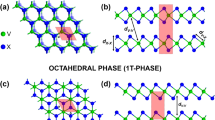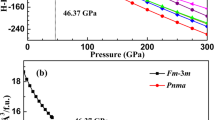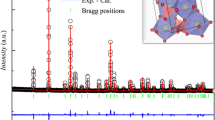Abstract
WE have found that the reduction of vanadium pentoxide (V2O5) as described below gives a form of vanadium oxide (VO2) which has not the magnetic discontinuity (at 341° K.) reported in the literature1,2.
This is a preview of subscription content, access via your institution
Access options
Subscribe to this journal
Receive 51 print issues and online access
$199.00 per year
only $3.90 per issue
Buy this article
- Purchase on Springer Link
- Instant access to full article PDF
Prices may be subject to local taxes which are calculated during checkout
Similar content being viewed by others
References
Perakis, J. Phys. Rad., 8, 473 (1927). Klemm and Grimm, Naturwiss., 27, 787 (1939). Dressnandt and Schottky, Naturwiss., 27, 840 (1939). Hoschek and Klemm, Z. anorg. allg. Chem., 226, 359 (1936); 242, 63 (1939).
Perakis and Wucher, C.R. Acad. Sci., Paris, 235, 354 (1952).
Flood and Kappa, J. Amer. Chem. Soc., 69, 998 (1947).
Lidiard, Rep. Prog. Phys., 17, 201 (1954).
Author information
Authors and Affiliations
Rights and permissions
About this article
Cite this article
ARCHER, M., ROEBUCK, D. & WHITBY, F. Magnetic Susceptibility of Vanadium Dioxide. Nature 174, 754–755 (1954). https://doi.org/10.1038/174754a0
Issue Date:
DOI: https://doi.org/10.1038/174754a0
This article is cited by
-
The effect of temperature on the magnetic susceptibility of vanadium pentoxide systems
Kolloid-Zeitschrift (1960)
Comments
By submitting a comment you agree to abide by our Terms and Community Guidelines. If you find something abusive or that does not comply with our terms or guidelines please flag it as inappropriate.



